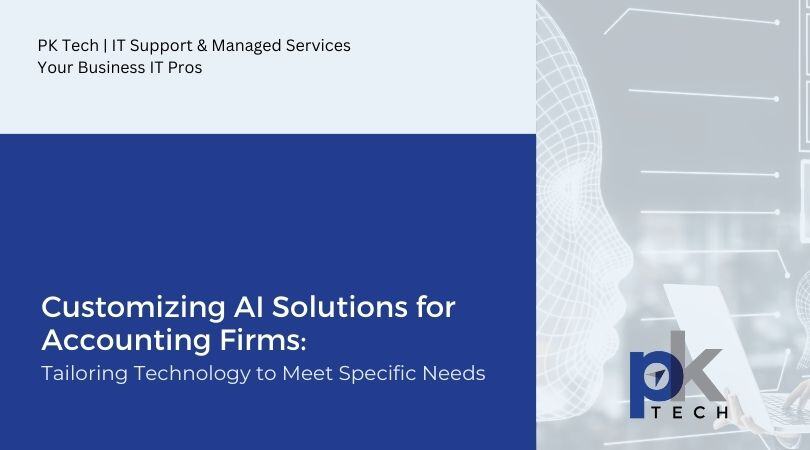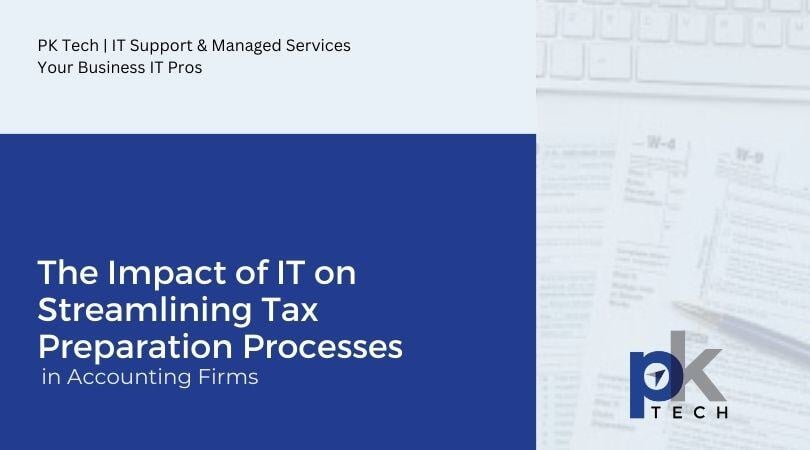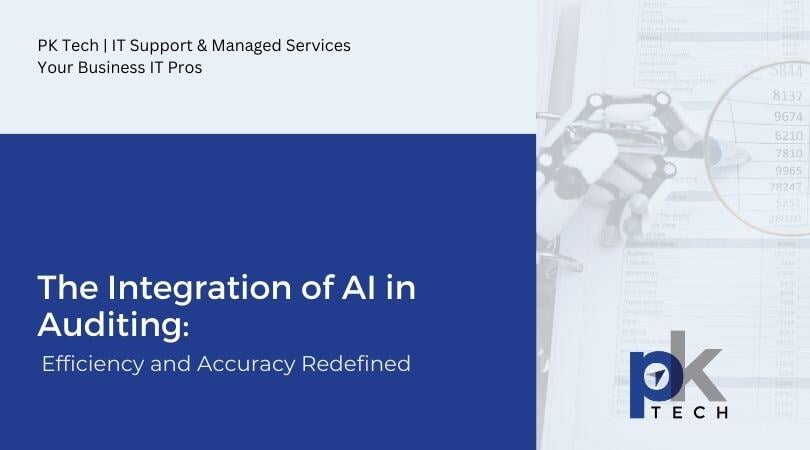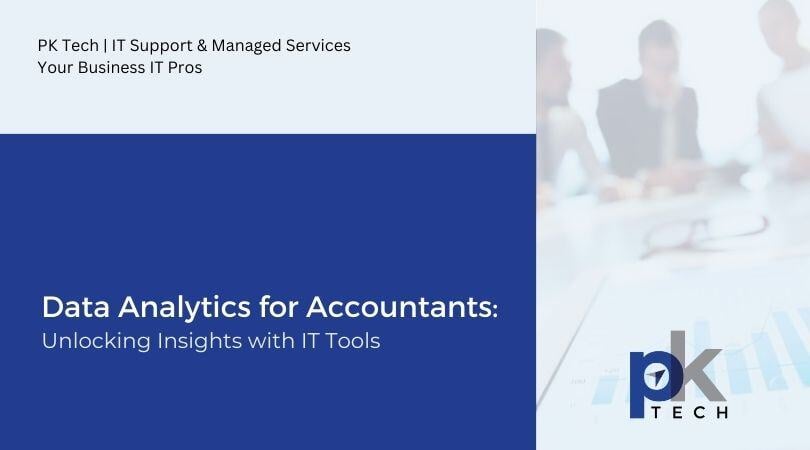The Impact of IT on Streamlining Tax Preparation Processes in Accounting Firms
Whether it’s the April 15th deadline, the October extension deadlines, or all of the corporate quarterly deadlines in between, accounting firms are...
4 min read
PK Tech February 11, 2025

With artificial intelligence demanding headlines almost weekly, businesses across industries are left with the question: should we be using AI?
For accounting firms, efficiency, accuracy, and security are of chief concern. Whether AI supports or threatens those concerns is the ultimate consideration. While AI solutions offer significant benefits, the key to unlocking their full potential lies in customizing these technologies to meet the specific needs of each accounting firm. One-size-fits-all solutions often fall short, as they may not align with a firm’s specific processes, client base, or goals. Customization is essential to ensure that AI tools provide maximum value and foster long-term growth.
This blog will explore how AI can be tailored to meet the needs of accounting firms and the steps involved in creating customized AI solutions.
Before implementing AI, accounting firms must identify their specific challenges and opportunities. Each firm operates with its own workflows, client expectations, and regulatory requirements. By understanding these factors, firms can make informed decisions about which AI solutions will most benefit their operations.
Some common needs among accounting firms that AI can address include:
Once the unique challenges and opportunities have been identified, the next step is customizing the AI solution to address these specific needs. Here are four ways to tailor AI for an accounting firm:
Most accounting firms use various software products for bookkeeping, tax preparation, payroll, and other services. To be effective, AI solutions need to integrate seamlessly with these existing tools. Custom AI solutions can be developed to integrate with platforms like QuickBooks, Xero, and Sage, allowing for a smooth flow of data and minimizing disruption to current workflows.
For example, if a firm relies heavily on a particular software product for financial reporting, a custom AI solution can be built to automate data extraction from this software and generate reports based on predetermined parameters.
In accounting, clear and timely communication with clients is key. AI-powered Natural Language Processing (NLP) can be used to create customized chatbots or virtual assistants that communicate in the firm’s tone and handle client inquiries efficiently. Whether it’s answering FAQs, scheduling consultations, or even processing basic queries related to tax filings, NLP tools can reduce the workload of human staff while ensuring clients get instant responses.
For firms that have a more personalized approach with clients, AI-driven systems can be trained on historical communication patterns, allowing them to respond in a tone and style that aligns with the firm’s brand voice.
Customized AI solutions can use advanced analytics to provide insights tailored to a firm’s specific clientele. For example, a firm that specializes in real estate accounting may benefit from an AI system that can analyze market trends, identify emerging risks, and suggest strategies based on a client’s specific portfolio. Similarly, an AI solution designed for an audit firm can be customized to identify anomalies or discrepancies that are specific to the industries they audit, improving detection rates and efficiency.
AI solutions should be scalable to accommodate firms of various sizes. A small boutique accounting firm may require AI tools with a lighter touch, focusing on tasks like expense categorization and tax preparation. On the other hand, a large firm with multiple departments may need a more complex system that can automate financial reporting across different branches or offer deep insights into client financial health.
Custom AI solutions can be designed to scale as the firm grows, ensuring that the technology remains relevant and beneficial over time.
The benefits are plentiful, but these four categories stand out. Here's how your firm can expect to benefit from integrating artificial intelligence:
By automating repetitive tasks such as data entry, document processing, and tax preparation, firms can significantly reduce the time spent on low-value tasks. This allows staff to focus on more complex, strategic activities, leading to improved productivity and efficiency.
AI solutions are built to process vast amounts of data with a high degree of accuracy. Customizing these systems to align with a firm’s specific processes can help reduce the risk of human error in financial reports, audits, and tax filings. AI also continuously learns from new data, improving its accuracy over time.
AI can analyze historical data and identify trends that might not be immediately obvious. By leveraging these predictive analytics, accounting firms can offer clients valuable insights that aid in decision-making, such as forecasting cash flow, tax liabilities, or potential business risks.
Although there is an initial investment in customizing and implementing AI solutions, the long-term savings can be substantial. By automating tasks and improving efficiency, accounting firms can lower operational costs, reduce errors, and increase profitability.
Implementing AI solutions doesn’t happen overnight. The process involves several steps, from initial needs assessment to ongoing optimization:
Customizing AI solutions for accounting firms is not just about implementing technology — it's about finding the right fit that enhances existing workflows, improves client service, and drives operational efficiency. By tailoring AI to meet the unique needs of each firm, accounting professionals can leverage this powerful tool to stay ahead of the curve, reduce costs, and ultimately provide better value to clients.
With the right approach, AI is not just a tool for automation — it becomes an integral partner in the firm’s success.
Ready to harness the power of AI? Our team at PK Tech can help your accounting firm maximize AI’s benefits. As a managed IT service provider, PK Tech is proud to offer 15 years of experience with a focus on accounting firms. We boast AICPAs SOC 2 Type II attestation, proving via third-party audit by an independent CPA firm that we passed a rigorous and comprehensive assessment of our security and privacy controls. Schedule a time to chat with our team here.

Whether it’s the April 15th deadline, the October extension deadlines, or all of the corporate quarterly deadlines in between, accounting firms are...

Artificial intelligence (AI) has been making waves across industries, and the field of auditing is no exception. Traditionally seen as a...

The role of accountants has evolved far beyond simply managing financial records and preparing tax returns. As businesses generate massive volumes of...